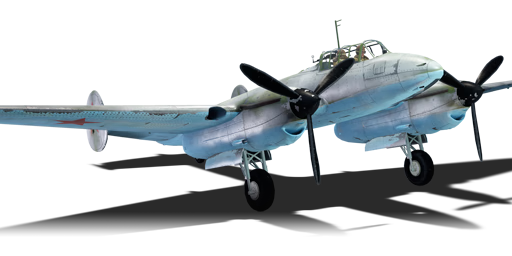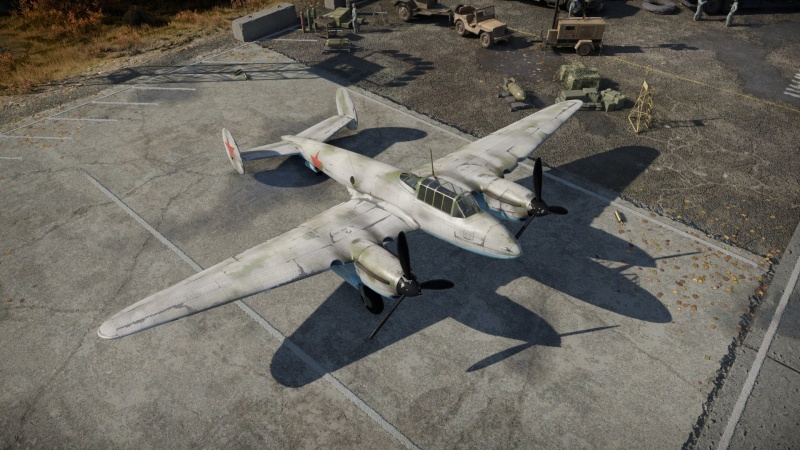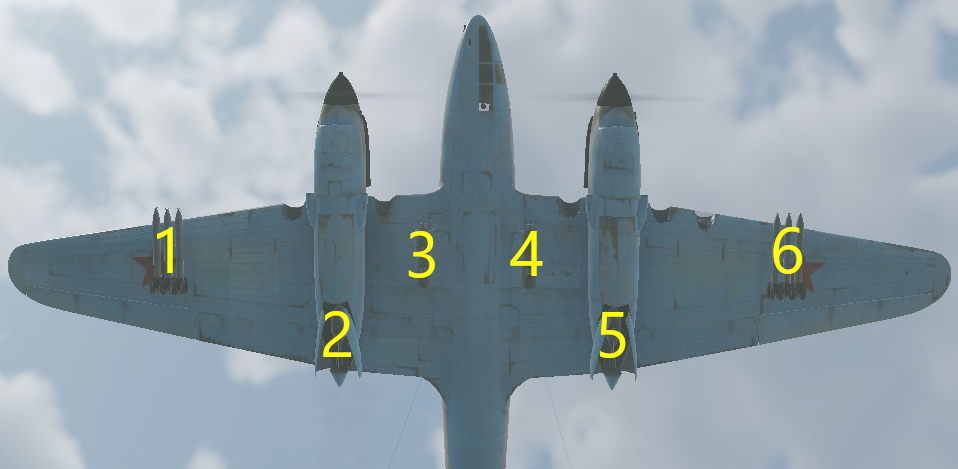Difference between revisions of "Pe-3"
(→Description) |
U120313908 (talk | contribs) (→History: Expanded (added operational history)) (Tag: Visual edit) |
||
| Line 147: | Line 147: | ||
{{Navigation-Start|Default weapon presets}} | {{Navigation-Start|Default weapon presets}} | ||
{{Navigation-First-Simple-Line}} | {{Navigation-First-Simple-Line}} | ||
| + | |||
* Without load | * Without load | ||
* 4 x 100 kg FAB-100sv bombs (400 kg total) | * 4 x 100 kg FAB-100sv bombs (400 kg total) | ||
| Line 227: | Line 228: | ||
The heavy fighters were delivered from the factory to the front lines with equipment corresponding to the main production Pe-3 aircraft. The total number of Pe-3s built in 1941 was 196; 11 more planes were assembled from available stocks of parts in April 1942. | The heavy fighters were delivered from the factory to the front lines with equipment corresponding to the main production Pe-3 aircraft. The total number of Pe-3s built in 1941 was 196; 11 more planes were assembled from available stocks of parts in April 1942. | ||
{{Navigation-End}} | {{Navigation-End}} | ||
| + | |||
| + | === Operational History === | ||
| + | The Pe-3 was first issued to the 95th High-Speed Bomber Aviation Regiment and was primarily used for ground attack and escort missions before being assigned to the defence of Moscow. The aircraft was also issued for reconnaissance missions but these resulted in very heavy losses with 1/4th of the total aircrafts being destroyed in its first three months of combat, a very high casualty rate that resulted in the relegation of the aircraft to less risky missions and some aircrafts being converted for other roles. The production of the aircraft was terminated due to the evacuation of the factories which resulted in a lower number of available units. | ||
| + | |||
| + | The Pe-3 continued to have a successful combat history, it was mainly assigned to reconnaissance air regiments and it played a crucial rule in the northern fleet to escort convoys with aid to the Soviet Union in what is known as the Arctic Convoys. | ||
| + | |||
| + | A soviet Pe-3 was captured by the Fins after crash landing around Lake Inari, it was pretty undamaged and after repairs it was put into service as Pe-301 as a photo-reconnaissance aircraft with 222h of flight before being destroyed on the ground by a soviet raid on the airfield it was stationed. | ||
| + | |||
| + | The Gneiss-2 radar was installed and tested on the Pe-3 between 1942 and 1943 but saw very limited service with only 15 being issued. | ||
== Media == | == Media == | ||
| Line 240: | Line 250: | ||
== See also == | == See also == | ||
''Links to the articles on the War Thunder Wiki that you think will be useful for the reader, for example:'' | ''Links to the articles on the War Thunder Wiki that you think will be useful for the reader, for example:'' | ||
| + | |||
* ''reference to the series of the aircraft;'' | * ''reference to the series of the aircraft;'' | ||
* ''links to approximate analogues of other nations and research trees.'' | * ''links to approximate analogues of other nations and research trees.'' | ||
| Line 245: | Line 256: | ||
== External links == | == External links == | ||
''Paste links to sources and external resources, such as:'' | ''Paste links to sources and external resources, such as:'' | ||
| + | |||
* ''topic on the official game forum;'' | * ''topic on the official game forum;'' | ||
* ''other literature.'' | * ''other literature.'' | ||
Latest revision as of 20:07, 27 September 2024
| This page is about the Soviet strike aircraft Pe-3. For other versions, see Pe-3 (e) and Pe-3bis. |
Contents
Description
The Petlyakov Pe-3 was a modification of the already-existing Pe-2 dive bomber. It was an attempt to turn the widely available airframe into a heavy/night fighter in response to the rise in night bombings during the early months of Operation Barbarossa. Despite its initial intentions, the Pe-3 was unable to effectively fulfill its role as a night fighter. This was due to the challenges pilots faced when trying to target enemy aircraft: dazzling searchlights and blinding gunfire. Before a solution to this could be found, it was repurposed as a daytime attack aircraft. However, even in this role, it struggled. One notable weakness was its insufficient frontal protection, rendering it susceptible to enemy attacks, which resulted in the significant loss of around 25% of the initial production aircraft. Attempts to bolster the aircraft's armour were initiated, though the ticking clock of World War II posed a problem, preventing the timely completion of this upgrade. Ultimately, a decision materialized to reassign the Pe-3 to reconnaissance divisions, relegating it to a rarity in subsequent ground attack missions.
The Pe-3 has been in the game since the start of the Open Beta Test prior to Update 1.27. As one of the earliest Soviet dedicated strike fighter platforms in the game, it doesn't disappoint with its loadouts, consisting of lightweight rockets and bombs. Unfortunately, the same cannot be said for its flight performance, which is disappointing when compared to other aircraft in its class due to a lack of manoeuvrability and relatively low engine power. Even so, it is very forgiving in mixed battles and serves as a good introduction to later aircraft in the line.
General info
Flight performance
Given that it was derived from a twin-engine dive bomber, the Pe-3's flight performance is very lacklustre. The one advantage of the Pe-3 is that it is relatively fast, capable of reaching 500 km/h in level flight and 600 km/h in a dive. However, its climb rate and acceleration are both poor due to a lack of engine power. The aircraft's turn rate is also quite mediocre even for a twin engine heavy fighter, though it is superior to aircraft such as the Do 217 J. The Pe-3's control surfaces are relatively responsive, though elevator and aileron compression starts to occur past 500 km/h. Unlike the Pe-2, the Pe-3 does not have dive brakes.
| Characteristics | Max Speed (km/h at 5,100 m) |
Max altitude (metres) |
Turn time (seconds) |
Rate of climb (metres/second) |
Take-off run (metres) | |||
|---|---|---|---|---|---|---|---|---|
| AB | RB | AB | RB | AB | RB | |||
| Stock | 485 | 469 | 27.4 | 28.7 | 7.2 | 7.2 | 326 | |
| Upgraded | 524 | 504 | 24.7 | 26.0 | 12.7 | 9.7 | ||
Details
| Features | ||||
|---|---|---|---|---|
| Combat flaps | Take-off flaps | Landing flaps | Air brakes | Arrestor gear |
| ✓ | ✓ | ✓ | X | X |
| Limits | ||||||
|---|---|---|---|---|---|---|
| Wings (km/h) | Gear (km/h) | Flaps (km/h) | Max Static G | |||
| Combat | Take-off | Landing | + | - | ||
| 500 | 470 | 320 | ~10 | ~5 | ||
| Optimal velocities (km/h) | |||
|---|---|---|---|
| Ailerons | Rudder | Elevators | Radiator |
| < 380 | < 380 | < 440 | > 307 |
| Compressor (RB/SB) | ||
|---|---|---|
| Setting 1 | ||
| Optimal altitude | 100% Engine power | WEP Engine power |
| 2,000 m | 1,100 hp | 1,186 hp |
| Setting 2 | ||
| Optimal altitude | 100% Engine power | WEP Engine power |
| 4,000 m | 1,050 hp | 1,132 hp |
Survivability and armour
The Pe-3 is actually quite survivable, given its larger size and spaced-out components. The aircraft's fuel tanks are located the wings and behind the cockpit, and are all self-sealing and feature an inert gas pressurisation system to prevent fires. As a result, the aircraft can sometimes survive fuel tank fires, though this should not be relied upon. Additionally, compared to its dive bomber sibling, the Pe-3 gets armour around the cockpit: 45 mm of bulletproof glass in front of the cockpit, 13 mm of steel on the pilot's seat and 6-12 mm of steel around the dorsal gunner's station.
However, the aircraft's engines and oil tanks are exposed and unarmoured, meaning that they are vulnerable to damage. Given that the aircraft is underpowered to begin with, the loss of an engine may prevent the aircraft from making it back to base.
Modifications and economy
If you intend on playing the Pe-3 as a ground attacker, the DZ-40 and RO-132 modifications should be your first priority in order to unlock the Pe-3's suspended armament options. If not, starting with offensive 12 mm belts is a good idea to unlock more effective ammunition. After that, focus on flight performance upgrades, particularly the engine upgrades, to improve climb rate and handling.
Armaments
Offensive armament
The Pe-3 is armed with:
- 2 x 12.7 mm Berezin UB machine guns, nose-mounted (250 rpg = 500 total)
Suspended armament
The Pe-3 can be outfitted with the following ordnance:
| 1 | 2 | 3 | 4 | 5 | 6 | ||
|---|---|---|---|---|---|---|---|
| 100 kg FAB-100sv bombs | 1 | 1 | 1 | 1 | |||
| 250 kg FAB-250sv bombs | 1 | 1 | |||||
| M-13UK rockets | 3 | 3 | |||||
| RBS-132 rockets | 3 | 3 | |||||
| Maximum permissible loadout weight: 720 kg Maximum permissible wing load: 360 kg Maximum permissible weight imbalance: 280 kg | |||||||
| Default weapon presets | |
|---|---|
| |
Defensive armament
The Pe-3 is defended by:
- 1 x 7.62 mm ShKAS machine gun, dorsal turret (750 rpg)
- 1 x 7.62 mm ShKAS machine gun, tail turret (250 rpg)
Usage in battles
Describe the tactics of playing in the aircraft, the features of using aircraft in a team and advice on tactics. Refrain from creating a "guide" - do not impose a single point of view, but instead, give the reader food for thought. Examine the most dangerous enemies and give recommendations on fighting them. If necessary, note the specifics of the game in different modes (AB, RB, SB).
Manual Engine Control
| MEC elements | ||||||
|---|---|---|---|---|---|---|
| Mixer | Pitch | Radiator | Supercharger | Turbocharger | ||
| Oil | Water | Type | ||||
| Controllable | Controllable Not auto controlled |
Not controllable Not auto controlled |
Controllable Auto control available |
Separate | Controllable 2 gears |
Not controllable |
Pros and cons
Pros:
- Great armament
- Air spawn in realistic and simulator battles
- Carries rockets, fantastic for ground striking and bomber hunting
- Good roll rate for a larger aircraft
Cons:
- Bad top speed for a twin-engine fighter
- Bad acceleration
- Bad turn rate
- Lack of defensive armament
- Severe control stiffening above 600 km/h IAS
History
| Archive of the in-game description | |
|---|---|
When the Great Patriotic War began in the summer of 1941, the Air Force of the Workers' and Peasants' Red Army urgently needed a patrol/interceptor aircraft to fight the enemy's bombers and scouts. But with a war in progress, troops could only quickly receive a twin-engined fighter if it were based on some plane currently in production. The older Pe-2's fighter design fit this need perfectly. In August 1941, the Petlyakov Design Bureau was instructed to design a fighter version of the Pe-2. The first prototype Pe-3 fighter, redesigned from the production Pe-2 bomber, series 16, flew for the first time on August 7, 1941. Only seven days passed between the order for the aircraft and its delivery for trials! Structurally, the Pe-3 fighter differed from the Pe-2 in the layout of its forward and middle fuselage and its armament. Additional fuel tanks were put in the plane's fuselage, with one located in the bomb bay and two others replacing the gunner's cockpit. The plane was modified to be a two-seater. The fighter had increased offensive armament. The nose weapon mount of the prototype Pe-3 model consisted of two 12.7 mm Berezin BK machine guns with 150 rounds each and one 7.62 mm ShKAS machine gun with 450 rounds. The TSS-1 upper mount in the navigator's cockpit consisting of a 7.62 mm ShKAS machine gun with 750 rounds was kept unchanged from the Pe-2. Since there was no one to provide fire from the lower rear of the aircraft, a fixed tail mount with a 7.62 mm ShKAS machine gun with 250 rounds, which had been tested before on the VI-100 high-altitude fighter, was installed. The plane's bombing armament was drastically simplified. Only four bomb racks remained from the Pe-2: two in the engine nacelle bomb bays and two (external) under the fuselage. The total bomb capacity was reduced to 400 kg for standard load and 700 kg (two 250 kg bombs and two 100 kg bombs) when overloaded. The brake covers under the wings were removed together with the gears, and, as a result, the ability to perform dive bombing was gone. Production Pe-3s had the ShKAS nose machine gun removed, but the magazine capacity of the BK machine guns was increased up to 250 rounds each. During armament testing of the nose mount, it was found that the Plexiglas fuselage nose section could not withstand the muzzle gas pressure, resulting in its destruction. Plexiglas was first replaced with duralumin and then with steel. The aircraft glazing was reduced when large observation blisters and the upper glass hatch of the gunner's cockpit were removed. The heavy fighters were delivered from the factory to the front lines with equipment corresponding to the main production Pe-3 aircraft. The total number of Pe-3s built in 1941 was 196; 11 more planes were assembled from available stocks of parts in April 1942. | |
Operational History
The Pe-3 was first issued to the 95th High-Speed Bomber Aviation Regiment and was primarily used for ground attack and escort missions before being assigned to the defence of Moscow. The aircraft was also issued for reconnaissance missions but these resulted in very heavy losses with 1/4th of the total aircrafts being destroyed in its first three months of combat, a very high casualty rate that resulted in the relegation of the aircraft to less risky missions and some aircrafts being converted for other roles. The production of the aircraft was terminated due to the evacuation of the factories which resulted in a lower number of available units.
The Pe-3 continued to have a successful combat history, it was mainly assigned to reconnaissance air regiments and it played a crucial rule in the northern fleet to escort convoys with aid to the Soviet Union in what is known as the Arctic Convoys.
A soviet Pe-3 was captured by the Fins after crash landing around Lake Inari, it was pretty undamaged and after repairs it was put into service as Pe-301 as a photo-reconnaissance aircraft with 222h of flight before being destroyed on the ground by a soviet raid on the airfield it was stationed.
The Gneiss-2 radar was installed and tested on the Pe-3 between 1942 and 1943 but saw very limited service with only 15 being issued.
Media
- Skins
- Videos
See also
Links to the articles on the War Thunder Wiki that you think will be useful for the reader, for example:
- reference to the series of the aircraft;
- links to approximate analogues of other nations and research trees.
External links
Paste links to sources and external resources, such as:
- topic on the official game forum;
- other literature.
| V.M. Petlyakov Design Bureau (Опытное конструкторское бюро Петлякова) | |
|---|---|
| Fighters | Pe-3 (e) · Pe-3 · Pe-3bis |
| Bombers | Pe-2-1 · Pe-2-31 · Pe-2-83 · Pe-2-110 · Pe-2-205 · Pe-2-359 · Pe-8 |
| USSR strike aircraft | |
|---|---|
| IL-2 | IL-2 (1941) · IL-2 (1942) · IL-2M (1943) · IL-2M type 3 · IL-2M "Avenger" · IL-2-37 · IL-2 M-82 |
| IL-8 | IL-8 (1944) |
| IL-10 | IL-10 · IL-10 (1946) |
| Pe-3 | Pe-3 (e) · Pe-3 · Pe-3bis |
| Su-2 | BB-1 · Su-2 MV-5 · Su-2 TSS-1 · Su-2 (M-82) |
| Su-6 | Su-6 · Su-6 (AM-42) · Su-6 (M-71F) |
| Su-8 | Su-8 |
| Tandem MAI | Tandem MAI |
| TIS MA | TIS MA |
| Tu-1 | Tu-1 |
| Yak-2 | Yak-2 KABB |






